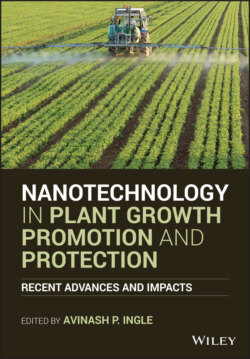Читать книгу Nanotechnology in Plant Growth Promotion and Protection - Группа авторов - Страница 56
3.3.2.3 Effects Zn NPs Through Soil Application
ОглавлениеThe crop plants are less sensitive to the toxic effects of Zn NPs at higher concentrations if supplied through soil (Table 3.2). In the meantime, soil application at a lower concentration below 100 mg/kg was not found beneficial or benign for most of the crops. Therefore, higher Zn NPs concentration (>100 mg/kg) is often used for soil application for different crop species. In a greenhouse experiment, the application of ZnO NPs to cucumber (Cucumis sativus) at 400 and 800 mg/kg caused a 10 and 60% increase in plant root dry mass, respectively, and a significant increase in the growth, yield, and fruit quality (carbohydrate, protein, and mineral content) (Zhao et al. 2014).
For legumes, Zn NPs used through soil application can show significant enhancement in root growth without negative effects on shoot growth. Medina‐Velo et al. (2017) observed positive effects on kidney beans root growth with soil application of 60–500 mg/kg ZnO NPs. Mukherjee et al. (2014) reported a similar effect on root growth promotion in green peas with Zn NPs application at 125–2000 mg/kg. Priester et al. (2012) reported a substantial enhancement in both root and shoot growth of soybean with 50–500 mg/kg ZnO NPs treatments. Table 3.2 shows the effects of Zn NPs on plant growth and promotion applied through different application modes.
